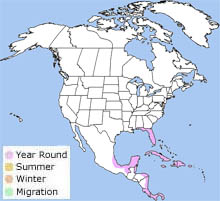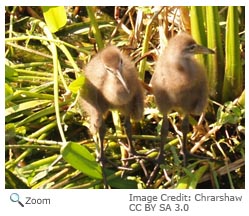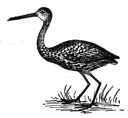Description
 The limpkin is 23-28 inches in length with a wingspan of about 42 inches. It has long legs and a long neck. It has brown and gray feathers with white spots and streaks. Its long, pointed bill is slightly curved and is yellow with a black tip. The limpkin is 23-28 inches in length with a wingspan of about 42 inches. It has long legs and a long neck. It has brown and gray feathers with white spots and streaks. Its long, pointed bill is slightly curved and is yellow with a black tip.
 The limpkin's bill is perfectly adapted to helping the limpkin get to its favorite prey, the apple snail. When the limpkin's bill is closed, there is a slight gap right before the tip that helps the limpkin use its bill like tweezers, making it easier for the limpkin to remove snails from their shells. In some limpkins the tip of the bill is also curved to the right just a bit to make it even easier for the limpkin to slide its bill into the shell of the apple snail. The limpkin's bill is perfectly adapted to helping the limpkin get to its favorite prey, the apple snail. When the limpkin's bill is closed, there is a slight gap right before the tip that helps the limpkin use its bill like tweezers, making it easier for the limpkin to remove snails from their shells. In some limpkins the tip of the bill is also curved to the right just a bit to make it even easier for the limpkin to slide its bill into the shell of the apple snail.
Range
 The limpkin is found in southern Georgia and most of Florida. It is also found in the American tropics. The limpkin is found in southern Georgia and most of Florida. It is also found in the American tropics. |
|
Habitat
The limpkin lives in woody swamps and marshes.
Diet
The limpkin hunts at night. A large part of its diet is made up of apple snails, but it also eats frogs, tadpoles, and insects.
Life Cycle
 The female lays 5-8 eggs in a nest of marsh vegetation just above the water. The nest is made of rushes and sticks and lined with moss or grass. The chicks are precocial and leave the nest and forage for food on the day they are born. The female lays 5-8 eggs in a nest of marsh vegetation just above the water. The nest is made of rushes and sticks and lined with moss or grass. The chicks are precocial and leave the nest and forage for food on the day they are born.
Behavior
 The limpkin is also known as the crying bird because of the sound it makes.
In fact, the screeching cry of the hippogriff in the movie Harry Potter and the Prisoner of Azkaban is the cry of the limpkin. The limpkin is also known as the crying bird because of the sound it makes.
In fact, the screeching cry of the hippogriff in the movie Harry Potter and the Prisoner of Azkaban is the cry of the limpkin.
|




 The limpkin is found in southern Georgia and most of Florida. It is also found in the American tropics.
The limpkin is found in southern Georgia and most of Florida. It is also found in the American tropics. 
